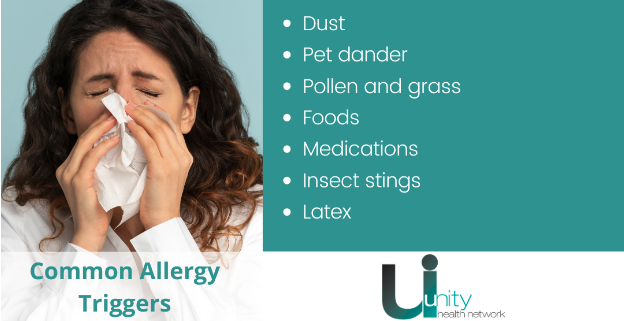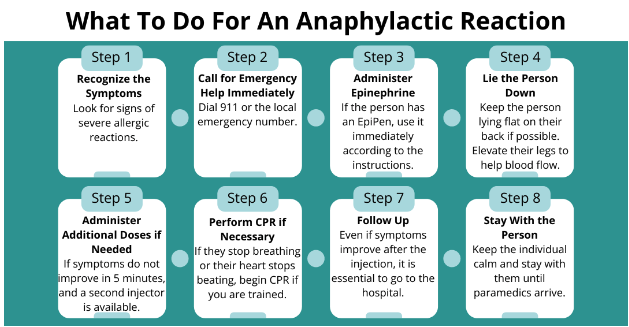Understanding Allergies and Anaphylaxis: Essential Insights
Apr 22, 2024
Spring is finally here, which not only means a turn in the weather but also, for many, an increase in allergy symptoms. An allergic reaction happens when the immune system mistakes something for an intruder and works to eliminate it from your body. Allergic reaction symptoms can be mild, such as a bit of sneezing and sniffing due to pollen, but some allergic reactions are much more serious. Anaphylaxis, a severe reaction, can put your life at risk. Allergy specialist Dr. Matthew B. Lutz at Unity Health Network is an expert in helping people manage allergies and anaphylaxis. Dr. Lutz offers the following information to help you better understand this serious medical issue.
What Are Allergies and Anaphylaxis?
Allergies are your body’s way of trying to protect you from what it perceives as danger.

So, you may have a reaction to dust that causes you to sneeze and your eyes to itch. Or you might have a more serious allergy to a type of food that causes a reaction called anaphylaxis. Food, medication, and insect stings are more likely to cause a severe reaction than other allergens.
What is anaphylaxis? As Dr. Lutz explains, “It is a severe hypersensitivity reaction in which our body releases histamine and some other chemical mediators in our body. This causes the body to go into shock, which can lead to a drop in blood pressure and constriction of the airways that make it difficult to breathe. It is a life threatening situation and needs to be treated immediately”.
You can read more about allergies and anaphylaxis here.
Recognizing the Signs of Anaphylactic Shock
Anaphylactic shock can happen very quickly after contact with or consumption of an allergen. Some signs of anaphylaxis, especially for those with food or medication allergies, can include:
- Severe nasal congestion
- Throat tightness and cough
- Hives or reddish, itchy skin that’s warm to the touch
- Swelling around the lips
- Increased pulse or drop in blood pressure
- Metallic taste in the mouth
- Diarrhea
- Dizziness
- Shortness of breath
- A feeling of impending doom
Anaphylaxis may progress through many symptoms, starting with severe nasal congestion and a cough that’s followed by throat tightness. If this happens, it means that the airways are constricted, and immediate action is necessary. Hives and lip swelling are other common signs to look for early on.
Dr. Lutz explains that people going through anaphylaxis often have a feeling of impending doom. This isn’t seen in less severe allergic reactions.
Read more about anaphylaxis here: https://acaai.org/allergies/symptoms/anaphylaxis/ and https://www.aaaai.org/conditions-treatments/allergies/anaphylaxis
Immediate Actions and Treatment Protocols
Since anaphylaxis comes on rapidly and can be life-threatening, immediate action is necessary. Dr. Lutz states that “50 percent of people will die in an hour in an untreated anaphylactic event,” so treating the symptoms of anaphylactic shock urgently can save your life.

The first step in an anaphylaxis emergency response is to call 911 for emergency medical help. Next, remove the allergen if possible. For example, remove the stinger from a bee sting. When a latex reaction occurs, move this material off or away from you. If your reaction is due to food, take the food out of your mouth.
If available, use an epinephrine auto-injector right away. Assessing someone’s breathing is also crucial. If the throat is constricted to the point that the person cannot breathe, start CPR while you wait for the emergency response team. An albuterol inhaler can also be used for additional relief of symptoms like wheezing, shortness of breath, or chest tightness.
As Dr. Lutz explains, “Epinephrine is the only medication that’s been shown and proven to help immediately in this type of reaction.” EpiPen is a common form of this medication. This self-injectable device is administered into the thigh, which is the most effective way to get epinephrine into the body quickly.
Quickly administer a dose of this medication to the person who has gone into anaphylactic shock. If further doses are needed, give them five to 15 minutes apart. You should also lay the person down so they’re comfortable. If they’re pregnant, make sure to lay them on their left side to prevent circulation issues.
Other steps that healthcare professionals may take include:
- Administering an IV line for blood pressure drops
- Watching for a secondary reaction that happens in about 20 percent of people usually around 4-6 hours from the inciting event.
Preventing Anaphylaxis: Tips from Dr. Lutz
Are there ways to prevent this reaction from happening? Dr. Lutz explains that there is no prevention for anaphylaxis once an allergen has been encountered. If you have a known allergy, especially to food, medication, or bee stings, you must be prepared to deal with anaphylaxis if it happens.
Even if you have not experienced anaphylaxis before, you should still be prepared if you have reacted to allergens in the past. “Usually it’s one sting and you get a pretty significant reaction,” explains Dr. Lutz. “But the second sting is the anaphylactic one because now your body has learned to mount an even more impressive immune response.”
Allergen avoidance strategies, such as avoiding certain foods, may help. But this isn’t always possible or easy. You cannot always prevent an insect sting while enjoying time outdoors or accidental cross-contamination, especially when dining out.
Dr. Lutz recommends creating an allergy action plan and educating those around you about it. This helps ensure that you receive epinephrine and other care immediately, if needed. Part of your action plan should be carrying EpiPen medication around with you at all times. Make sure others know how to administer these injections. Avoid storing your medication in places that are too hot or too cold, like your car.

You should also have a doctor evaluate you every 12 to 18 months to check for changes in your allergies and get an updated EpiPen prescription, as many of these devices expire after 12 to 18 months.
Living with Allergies: Management and Care
Having an allergy management plan is a vital part of living with allergies. It's important to see your doctor for evaluation and make sure you have EpiPen refills. Taking steps to avoid allergen exposure is also a necessary step. This may include reading food labels, inquiring about a restaurant’s food preparation, or wearing long pants and long sleeves when outside in a season when stinging insects are most active.
Allergy doctors can help you create a personalized treatment plan based on your needs. This might include epinephrine for more severe allergies to insect stings, food, and medication. Your doctor may also suggest other treatments for allergies including immunotherapy or allergy injections, which can help your immune system learn to tolerate allergens, such as pet dander or pollen. These additional treatments may reduce allergic reactions.
What if you suspect you have allergies but aren’t sure? Allergy testing will allow you to learn what allergens affect you. This can be done using skin or blood tests. Labs analyze blood samples, while skin tests produce an allergic reaction on your skin.
Why Trust Unity Health Network for Allergy Care?
Did you know that the Akron Beacon Journal named Dr. Lutz the best allergist in Akron? As a Unity Health Network allergy care provider, he offers individualized treatment to help each patient manage allergies safely and effectively.
These are a few of the allergy care services we provide at Unity Health Network:
- Allergy testing
- Immunotherapy for allergies
- Epinephrine and other emergency treatment medications
Looking for help with allergies? Schedule a consultation with Dr. Lutz for expert allergy management and anaphylaxis treatment plans. Contact Unity Health Network today for more information on our allergy services.




